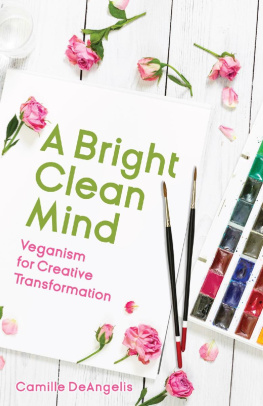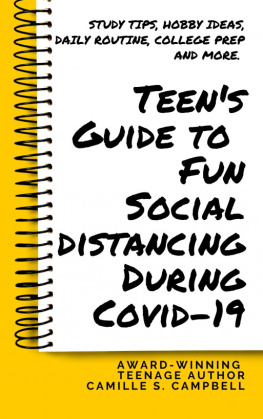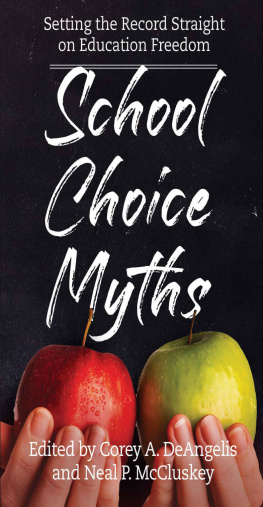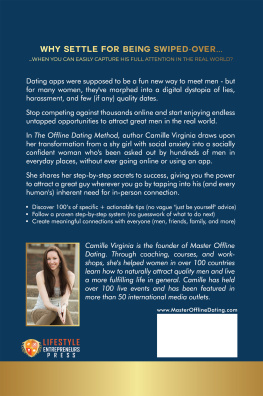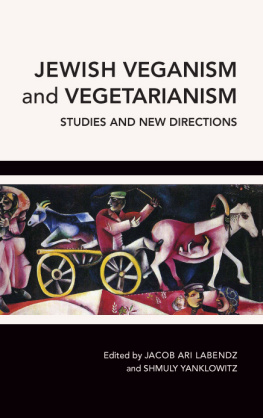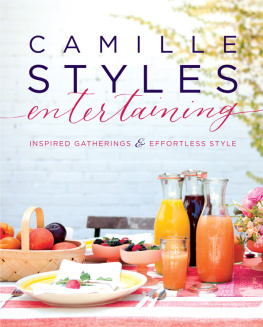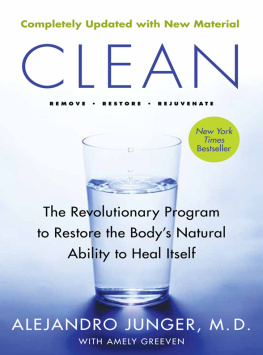Camille DeAngelis - A Bright Clean Mind: Veganism for Creative Transformation
Here you can read online Camille DeAngelis - A Bright Clean Mind: Veganism for Creative Transformation full text of the book (entire story) in english for free. Download pdf and epub, get meaning, cover and reviews about this ebook. year: 2019, publisher: Mango, genre: Non-fiction / History. Description of the work, (preface) as well as reviews are available. Best literature library LitArk.com created for fans of good reading and offers a wide selection of genres:
Romance novel
Science fiction
Adventure
Detective
Science
History
Home and family
Prose
Art
Politics
Computer
Non-fiction
Religion
Business
Children
Humor
Choose a favorite category and find really read worthwhile books. Enjoy immersion in the world of imagination, feel the emotions of the characters or learn something new for yourself, make an fascinating discovery.
- Book:A Bright Clean Mind: Veganism for Creative Transformation
- Author:
- Publisher:Mango
- Genre:
- Year:2019
- Rating:3 / 5
- Favourites:Add to favourites
- Your mark:
- 60
- 1
- 2
- 3
- 4
- 5
A Bright Clean Mind: Veganism for Creative Transformation: summary, description and annotation
We offer to read an annotation, description, summary or preface (depends on what the author of the book "A Bright Clean Mind: Veganism for Creative Transformation" wrote himself). If you haven't found the necessary information about the book — write in the comments, we will try to find it.
A Bright Clean Mind: Veganism for Creative Transformation — read online for free the complete book (whole text) full work
Below is the text of the book, divided by pages. System saving the place of the last page read, allows you to conveniently read the book "A Bright Clean Mind: Veganism for Creative Transformation" online for free, without having to search again every time where you left off. Put a bookmark, and you can go to the page where you finished reading at any time.
Font size:
Interval:
Bookmark:
Also by Camille DeAngelis
Fiction
The Boy fro m Tomorrow
Immacu late Heart
B ones & All
P etty Magic
M ary Modern
Nonfiction
Life Without Envy: Ego Management for Creat ive People
Mo on Ireland

Veganism for Creative Trans formation
by Camille DeAngelis

Co ral Gables
Copyright 2019 Camille DeAngelis
Cover & Layout Design: Je rmaine Lau
Published by Mango Publishing Group, a division of Mango Media Inc.
Mango is an active supporter of authors rights to free speech and artistic expression in their books. The purpose of copyright is to encourage authors to produce exceptional works that enrich our culture and our ope n society.
Uploading or distributing photos, scans, or any content from this book without prior permission is theft of the authors intellectual property. Please honor the authors work as you would your own. Thank you in advance for respecting our author s rights.
For permission requests, please contact the pub lisher at:
Mango Publis hing Group
2850 Douglas Road, 2nd Floor
Coral Gables, FL 33134 USA
A Bright Clean Mind: Veganism for Creative Tran sformation
ISBN: (p) 978-1-64 250-074-5
LCCN: 2019941802
BISAC: SEL009000, SELF-HELP / Creativity
For Mumsy,
who made every word possible.
Tell me what you eat and I will tell yo u who you are.
Thich Nhat Hanh
Ta ble of Contents
Part II: Experiments and Explorations + Conversations
with Vegan Artists
I grew up on a steady diet of Jim Henson, Judy Blume, and chicken cutlets, and I knew from the time I could grasp a crayon that I was going to be an artist. The more I used my imagination, though, the more uneasy I felt about eating and wearing animals who surely wanted to go on living as much as I did. When I was twenty, I went completely vegetarian, and creatively speaking the following decade felt like an alternating series of false starts and measured joys. I published three books, but I never felt as though these accomplishments served anyo ne but me.
When I became vegan seven years ago, I experienced an exhilarating surge of creativity that has continued to this day. As the knock against vegans goes, I wanted to tell everyone I knew that our bodies produce casomorphin in response to the casein in dairy cheese, meaning that we are literally addicted to our favorite chvre; that were the only species that drinks the breast milk of another; and did you ever wonder why, if cows milk has so much calcium, everyone we know over the age of seventy is suffering from osteoporosis? I told anyone who would listen that I could feel new pathways lighting up in my brain, that something inside me had been liberated. I was excited to try new recipes and veganize the old ones, to share everything I was learning, and over the years that excitement has compound ed itself.
But when I talk about going vegan with people who arent, I usually sense an invisible wall going up between us. Its all very well and good for me, I can almost hear them thinking, but my way of life is not feasible for them .
Apart from the fact that Ive written some pretty good novels, theres nothing remarkable about me. I wasnt raised in anything remotely resembling an alternative lifestyle. I have wistful memories of stopping for Egg McMuffins at dawn en route to my grandparents vacation house in the Poconos. But I also remember calling the toll-free number on the back of a Noxzema jar to ask if Proctor & Gamble tested on animals. I cant recall what initial click of insight possessed me to do this; my parents werent pet people, and as Carol Adams points out in The Sexual Politics of Meat , meat eating is the most frequent way in which we interact with animals. All I know is that I wasnt ready to follow the thread of logic that connects testing on animals with eating animals. In my teens, I ate tuna sandwiches and a couple of steaks a year and called myself a part-time v egetarian.
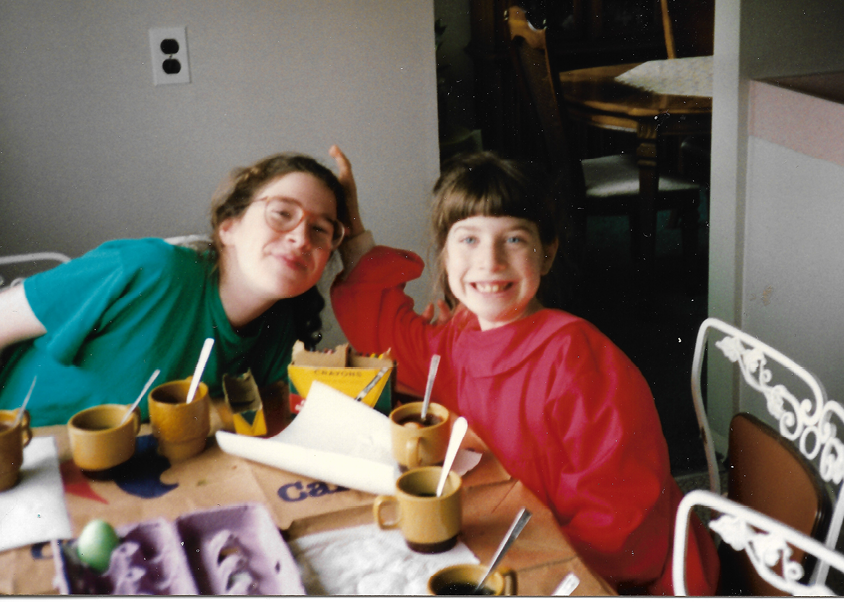
Dyeing Easter eggs with my sis ter Kate, 1992.
This was still my dietary MO my freshman year at NYU, which is when I first began to think about writing a novel. I met this lovely, gentle girl named Chloe in one of my core classes, and I wanted to be friends with her even more when she confessed she was already worki ng on one.
This is what I have so far, she said shyly, handing me an old-school black-and-white composition notebook. It was two-thirds full, maybe more, and I could tell by the hurried quality of her handwriting that shed spent many evenings flush with in spiration.
I knew enough to want to spend as much time as I could with people who werent only talking about making art. So one night, Chloe and I went to this French restaurant in the West Village that is long since out of business. We ordered two deluxe steak dinners, and the waiter asked if we wanted wine. (Three months living in Manhattan, and I still hadnt been carded.) Chloe and I traded devi ous looks.
Here we were, two eighteen-year-old aspiring novelists in a candlelit restaurant in New York City talking about books and ambition, drinking illegally, eyes alight with our newfound kinship. I felt terribly grown up, and excited , because in a sense we had settled in at this table for two to plot out at least the next ten years of our lives.
We were clichs, of course we were. But of all the elements in this scene, the one that makes me cringe is the meat on my plate.
The following summer, I found a copy of Conversations with God on the bargain cart at the Strand, an East Village institution advertising eighteen miles of books. Id dismissed the book as new-age baloney whenever I had to reshelve it at my bookstore job back in high school, but this time it practically leapt off the cart into my hands. I vividly remember reading the following lines on the A train one afternoon:
A [highly evolved being], in fact, would never consume an animal, much less fill the ground, and the plants which the animal eats, with chemicals, then fill the animal itself with chemicals, and then consume it. A HEB would correctly assess such a practice to be suicidal.
Whether or not I believed these words actually came from God, they provoked a physical reaction in me. I did not want to be a flesh eater, not part-time, not at all. But it took me another decade to un-believe the cultural narrative that cows willingly give us their milk, that chickens have no use for their eggs, that these animals arent made to suffer for what we take from them.
None of tha t is true.
What Im about to write is a difficult thing for artists to face, because were the ones who are supposed to be seeing into the heart of the culture, testing out radical new ways of thinking and being and doing, and calling bullshit! whenever we see it. The truth is, though, that we are not nearly as open-minded as we like to think we are. How often do we say that something is not for us when we havent given it a chance? How often do we actually challenge the prevailing cultural norms? And what about all the times we look back over our thoughts and actions and feel a creeping shame at how little consideration we gave the needs and feelings of those around us?
If we truly want to grow as artists and as humans, we have to be willing time and again to look for the kinder, more responsible, more loving way, especially when that way is not the convenient one. As artists and innovators, it is our responsibility to offer a reasoned critical response to the dominant culture, and the most fundamental expression of cultur e is food.
Next pageFont size:
Interval:
Bookmark:
Similar books «A Bright Clean Mind: Veganism for Creative Transformation»
Look at similar books to A Bright Clean Mind: Veganism for Creative Transformation. We have selected literature similar in name and meaning in the hope of providing readers with more options to find new, interesting, not yet read works.
Discussion, reviews of the book A Bright Clean Mind: Veganism for Creative Transformation and just readers' own opinions. Leave your comments, write what you think about the work, its meaning or the main characters. Specify what exactly you liked and what you didn't like, and why you think so.

